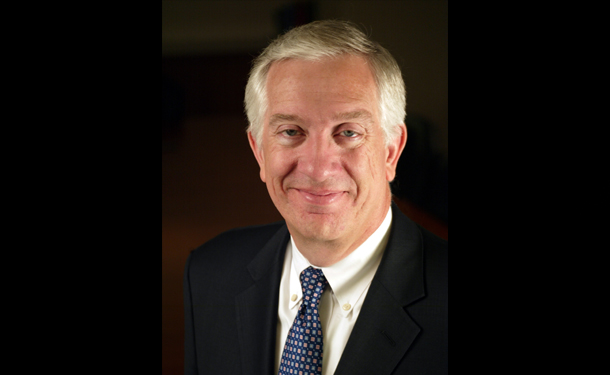Mark Earley, former state senator and attorney general of Virginia, has changed his mind about incarceration and the ultimate punishment within the United States’ current criminal justice system. While he was attorney general, the state executed 36 people.
Now Earley is speaking out about mass incarceration and the death penalty. He currently serves as co-chair of Governor Terry McAuliffe’s Commission on Parole Review and is immediate past president of the nationwide ministry, Prison Fellowship USA, founded by Charles Colson. He practices law with Earley Legal Group in Leesburg.
Earley will speak Tuesday, Oct. 20 at 7 p.m. in Martin Chapel at Eastern Mennonite University (EMU) on “Why America Incarcerates So Many People and What We Can Do About It.”
Broad coalition endorsing visit
His visit is sponsored by a diverse coalition of more than 20 area organizations, including EMU’s Center for Justice and Peacebuilding (CJP).
Earley’s visit comes months after the Harrisonburg Police Department, aided by CJP-trained practitioners from EMU, James Madison University and the local Fairfield Center, announced an ambitious restorative justice program aimed at reducing local incarceration rates and reforming the local criminal justice system.
“In light of all of the recent conversation going on in our community over the issue of jail expansion, some of us saw Mark Earley as an ideal person to speak to the urgent need for criminal justice reform, given his conservative credentials and his years of experience in the field,” said Harvey Yoder, Mennonite pastor, counselor and criminal justice advocate. “The more than 20 local agencies and organizations officially endorsing the event, ranging from the Harrisonburg Police Department to James Madison University’s Department of Justice Studies, reflects some of the broad interest in this topic.”
Yoder is among the leaders of a local chapter of the Fellowship of Reconciliation, an interfaith peace organization, as well as of a local working group focused on local justice issues known as Building Better Communities.
Additional organizations endorsing Earley’s visit include the Valley Family Forum, Virginia Organizing, Our Community Place, On the Road Collaborative, NAACP Harrisonburg chapter, Northeast Neighborhood Association, NewBridges Immigrant Resource Center, the Martin Luther King Way Coalition, Mahatma Ghandhi Center for Global Nonviolence, The Institute for Reform and Solutions, Immanuel Mennonite Church, The Harriet Tubman Cultural Center, Harrisonburg/Rockingham/Page Reentry Council, Harrisonburg/Rockingham Interfaith Association, Harrisonburg City School Board, Harrisonburg Democratic Committee, Gemeinschaft Home, The Fairfield Center and Community Mennonite Church.
Relationships with incarcerated were influential
Earley, an attorney, practiced law for 15 years in Norfolk, Virginia, as a criminal defense attorney and then served in the Virginia State Senate from 1988-1998. During that time, Virginia executed 36 people. In 1998, he was elected Attorney General of the Commonwealth of Virginia, resigning in 2001 to run an unsuccessful campaign for governor. For all of these years, Earley says he supported the death penalty, but had increasing doubts about its morality.
He also delved deeply into the lives and culture of the incarcerated as part of a task force on gangs and youth violence, and visited every juvenile detention center in Virginia – a visceral experience that he recounts in an interview in The American Conservative.
After losing the governor’s election to Mark Warner, Earley served the next eight years until 2011 as president of Prison Fellowship USA. According to its website, Prison Fellowship helps to make prisons “more rehabilitative places, advocates for a restorative criminal justice system; and supports church and service providers to support former prisoners, their families and communities.”
Earley is now a vocal opponent of the death penalty, often joining bipartisan efforts such as The Constitution Project to advocate for reform. An essay published in the April 2015 issue of the University of Richmond Law Review summarizes his change of view: titled “A Pink Cadillac, An IQ of 63, and a Fourteen-Year-Old From South Carolina: Why I Can No Longer Support the Death Penalty,” the essay reflects on the recent exoneration of 14-year-old George Stinney, the youngest person executed in the United States. In 1944, the teenager was convicted of killing two white girls after a two-hour trial and a 10-minute jury deliberation riddled with impropriety.
“If you believe that the government always ‘gets it right,’ never makes serious mistakes, and is never tainted with corruption, then you can be comfortable supporting the death penalty. I no longer have such faith in the government and therefore, cannot and do not support the death penalty,” Earley writes at the beginning of his essay.
Editor’s note: Valley Family Forum is no longer providing an endorsement of this event. [Oct. 16, 2015]

I don’t understand how anyone can be against the death penalty at this point in time. Over two million Americans are flooding the prison system, recidivism rate is at the highest its ever been, while prisons don’t reform a single person. Rapists, pedophiles, murders who always commit the same crime after being released, after putting a strain on the prison system. How can anyone be against the death penalty at this point?
I guess it takes a teeny bit of imagination and maybe even the slightest bit of biblical understanding to be against the death penalty.
If we say that killing people is wrong, then killing people is wrong. If there is the slightest chance that someone might be put to death erroneously, then it is wrong. Another matter of note is that putting someone to death costs more than incarcerating that person for the rest of his or her life. I do not want my hard-earned tax dollars used to kill people, particularly when it’s known that innocent people are mistakenly put to death. I want my money and resources used for life, not death!